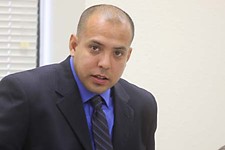Point Austin: Hanging Together or Apart
Sanders vote less about money than community, race, and justice
By Michael King, Fri., Aug. 6, 2010

Last week at City Council, a good deal of rhetoric was devoted to "the process" – in this case the judicial process, which opponents of the proposed settlement in the Nathaniel Sanders II/Leonardo Quintana civil rights lawsuit explained would finally determine "what really happened" when Quintana shot Sanders last year and thus settle the matter once and for all. But nobody on the dais had consulted federal Judge Sam Sparks, who – after council's Thursday vote to reject the settlement that both sides' attorneys had told Sparks on July 12 they were ready to accept – blew "the process" out of the water, informing the city that it would now not see his court before November 2011, and moreover, any further settlement talks damn well better include every single member of the City Council. Moreover, declared Sparks, since he couldn't trust the city to "support the recommendations of its lawyers," any future settlement would have to be concluded at least 25 days in advance of a trial date.
Well, now they've got plenty of time – although it will truly be a hoot if Sparks holds the council to the letter of the negotiating stipulation that further talks include every council member, which under the Open Meetings Act could only occur in a public meeting. Last week's attempt at public negotiation didn't turn out so well. (For more detail, see "Sanders Settlement Collapses.")
Praise for "the process" had come mainly from Mayor Lee Leffingwell and Mayor Pro Tem Mike Martinez, who had declared in advance of the meeting that they would vote to reject the tentative $750,000 settlement with the Sanders family. On the other hand, there were three votes to agree – Sheryl Cole, Bill Spelman, and Laura Morrison – who argued that in light of the council's instructions to its defense attorneys, a deal is a deal (where have we heard that before?) and that the city badly needed to move on from litigation to community reconciliation.
Randi Shade and Chris Riley, the swing votes in this melodrama, first proposed reducing the settlement to $500,000 – which Riley called an "arbitrary" but "more neutral" number – but when that motion couldn't garner another vote, they provided the 4-3 majority to defeat any settlement at all.
Why had the middle ground effectively become "$500,000 or nothing"? Riley told me this week: "I thought about why I didn't vote for $750,000 in the first place, and there was the point that '750' represented a victory for one side – which is not the purpose of a settlement. At that point, I couldn't do that." Shade said this week that she remains hopeful that even under the judge's restrictions, a settlement remains achievable some time in the next year. "I'm still hopeful," she told me, "that there's an opportunity to settle that does not assign guilt, does not polarize the community, and that's financially responsible."
In Black and White
Ah, yes, polarization. In the immediate aftermath of the vote, emotions are running high, with the yea/nay denunciations predictably and painfully breaking largely along Eastside/West side and black/white racial lines. Online trolls are demanding Austin NAACP President Nelson Linder's ouster, after Linder denounced the vote as a declaration of "war" on the black community. Now that "the process" has been extended for another 16 months, we can look forward to weeks or months of similarly intransigent conversations; perhaps the council majority will explain how that public flame war is supposed to provide, in Mayor Leffingwell's subsequent conciliatory phrase, "some immediate relief to people who I know are suffering."
The vote to reject the settlement was reinforced by the Austin Police Association and official insistence that the Sanders family attorney, Adam Loewy, had undermined the deal by telling a reporter that the settlement would constitute an acknowledgment by the city that the shooting was "unjustified." Shade told me she believes that statement violated both the letter and spirit of the proposed agreement; Riley said the entire council discussion would certainly have been different without Loewy's statement, although he can't say it would have turned out any differently. He read to me the relevant section from the settlement summary: "The terms include a confidentiality/nondisparagement clause, requiring the plaintiffs and their counsel to maintain confidentiality as to the terms and existence of the settlement, and to not claim the settlement as a victory, or to share their evidence with the press."
Responded Loewy via e-mail: "That is totally absurd. We have done everything in our power to uphold and respect the agreement. Moreover, Shade's own argument confirms there is a valid settlement agreement. The truth is this isn't about me; this is all driven by the APA's strong-arm political tactics. Certain members of this council are more concerned with appeasing APA than respecting the terms of a settlement agreement." Loewy insists that a valid settlement agreement remains in place and that he "expects the city to live up" to its terms.
He wasn't quite finished. "The city has treated my clients like second-class citizens since the day of the shooting, and this despicable pattern continues with this latest stunt. Regardless, we are more confident than ever that justice will prevail in this case. You can't treat people like this and expect to be on the side of justice."
Whatever else it might do, that frank exchange of views doesn't seem likely to advance the common cause of reconciliation. Spelman, remarkably sanguine considering the circumstances, said that while he expected a delay of some months to allow both sides to "cool their jets," settlement talks would resume probably around the turn of the year, after trial preparation and after the city gets some clarification from the court about how the council, in practical terms, should be involved. He preferred to accentuate the positive: "We did at least send a fairly clear message to the plaintiffs and the plaintiffs' attorneys that there is a number we can settle this case for – a majority of this council can settle this case for. It's not $750,000."
Whether that realization will be sufficient to move the churning public conversation about race, the Austin Police Department, young black men, and one whole community in a more positive direction remains to be seen. We had better start to get it right. Sparks offered an additional warning: "It is not clear if the parties will ever be able to obtain a constitutionally fair trial in Austin because of the pretrial publicity and public statements made by counsel and public officials to the media."
See Judge Sam Sparks' order concerning the Sanders family lawsuit here.
Got something to say on the subject? Send a letter to the editor.










